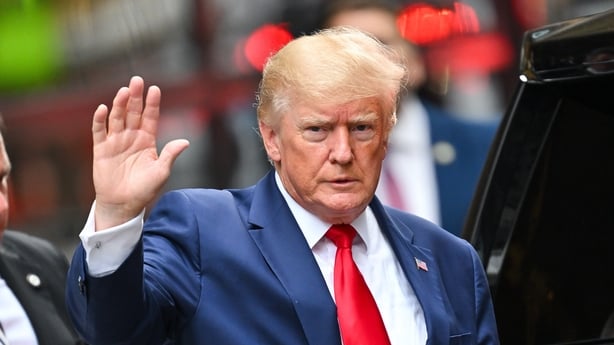Donald Trump sexually abused magazine writer E. Jean Carroll in the 1990s and then defamed her by branding her a liar, jurors decided, dealing the former US president a legal setback as he campaigns to retake office in 2024.
The nine-member jury in Manhattan federal court awarded about $5m in compensatory and punitive damages.
The jury deliberated for just under three hours. It rejected Mr Trump's denial that he assaulted Ms Carroll and ruled in her favour. To find him liable, the jury of six men and three women was required to reach a unanimous verdict.

Ms Carroll, 79, testified during the civil trial that Mr Trump, 76, raped her in a Bergdorf Goodman department store dressing room in Manhattan in either 1995 or 1996, then harmed her reputation by writing in an October 2022 post on his Truth Social platform that her claims were a "complete con job", "a hoax" and "a lie".
Ms Carroll held hands with her lawyers as the verdict was read. She left the courthouse with her lawyer Roberta Kaplan, smiling and wearing sunglasses, and entered a car without speaking to reporters.
Jurors were tasked with deciding whether Mr Trump raped, sexually abused or forcibly touched Ms Carroll, any one of which would satisfy her claim of battery. They were separately asked if Mr Trump defamed Ms Carroll.
Because this was a civil case, Mr Trump faces no criminal consequences and, as such, there was never a threat of prison.
Mr Trump was absent throughout the trial which began on 25 April. In a post on his Truth Social platform, he called the verdict a "disgrace" and said, "I have absolutely no idea who this woman is".
Because this was a civil case, Mr Trump faces no criminal consequences.
Mr Trump's legal team opted not to present a defence, gambling that jurors would find that Ms Carroll had failed to make a persuasive case.
Mr Trump had said Ms Carroll, a former Elle magazine columnist and a registered Democrat, made up the allegations to try to increase sales of her 2019 memoir and to hurt him politically.
Because the case was in civil court, Ms Carroll was required to establish her rape claim by "a preponderance of the evidence" - meaning more likely than not - rather than the higher standard used in criminal cases of "proof beyond a reasonable doubt".
Ms Carroll had to show "clear and convincing evidence" to prove her defamation claim.
Her lawyers called to the witness stand two other women who testified that Mr Trump sexually assaulted them decades ago.
Former businesswoman Jessica Leeds told the Manhattan federal court that Mr Trump groped her in the business class section of a flight in the United States in the 1970s.
Journalist Natasha Stoynoff said Mr Trump kissed her without her consent during an interview at his Mar-a-Lago estate in 2005.
Around a dozen women accused Mr Trump of sexual misconduct ahead of the 2016 election that sent him to the White House.
He has denied all the allegations and has never been prosecuted over any of them.
A video of a sworn deposition he gave in October was played to the jury. In it, Mr Trump called Ms Carroll "a liar" and "really sick person".
His lawyers argued that Ms Carroll invented the allegation "for money, for political reasons, and for status".
She filed her lawsuit under a New York law that gave victims of sexual assault a one-year window to sue their alleged abusers decades after attacks may have occurred.
It accused Mr Trump of one count of battery, "when he forcibly raped and groped" Ms Carroll, and one count of defamation for comments that caused "reputational, emotional, and professional harm".

